“If We Lose – Democracy Will Lose”: Ukraine Engages International Legal Community to Address War Crimes
June 27, 2024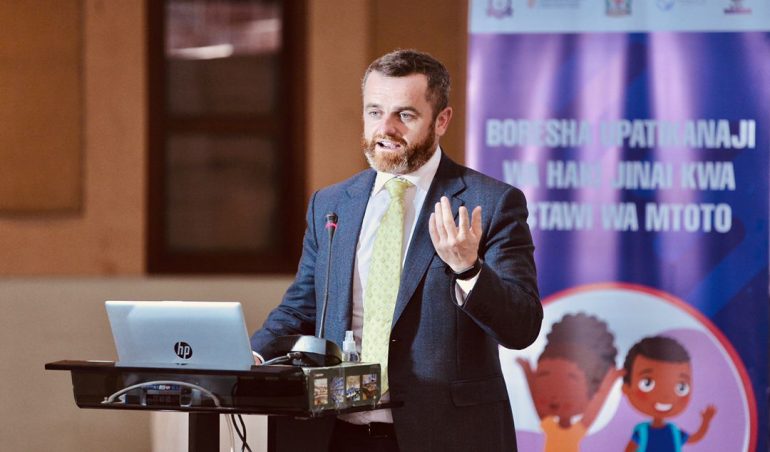
Ukrainian officials are using every opportunity to reach the international community and reinforce support from international partners in fighting Russia’s aggression. This is done through various tools, connections, and in forums at different levels. One critical area where Ukraine seeks support is within the legal community to address the numerous international crimes committed amidst the full-scale invasion. The EU Advisory Mission (EUAM) Ukraine supports its counterparts, specifically the Office of the Prosecutor General (OPG), in various ways to ensure that perpetrators of these crimes ultimately face justice and are held accountable for the atrocities and devastation inflicted on people’s lives during this unjustified war of aggression.
Last month, the EUAM Ukraine, together with the United Kingdom Government, Irish Rule of Law International (IRLI) and the organising committee of the World Bar Conference, facilitated the attendance of Yuriy Belousov, the head of the department dealing with war crimes at the OPG, at the World Bar Conference (WBC). Belousov addressed an audience of leading legal and political figures as the keynote speaker on “Rule of Law Under Fire: Existing in an Age of Conflict”. The WBC in Belfast provided a significant opportunity for the OPG and EUAM to engage with senior legal and judicial actors on international crime matters in Ukraine.
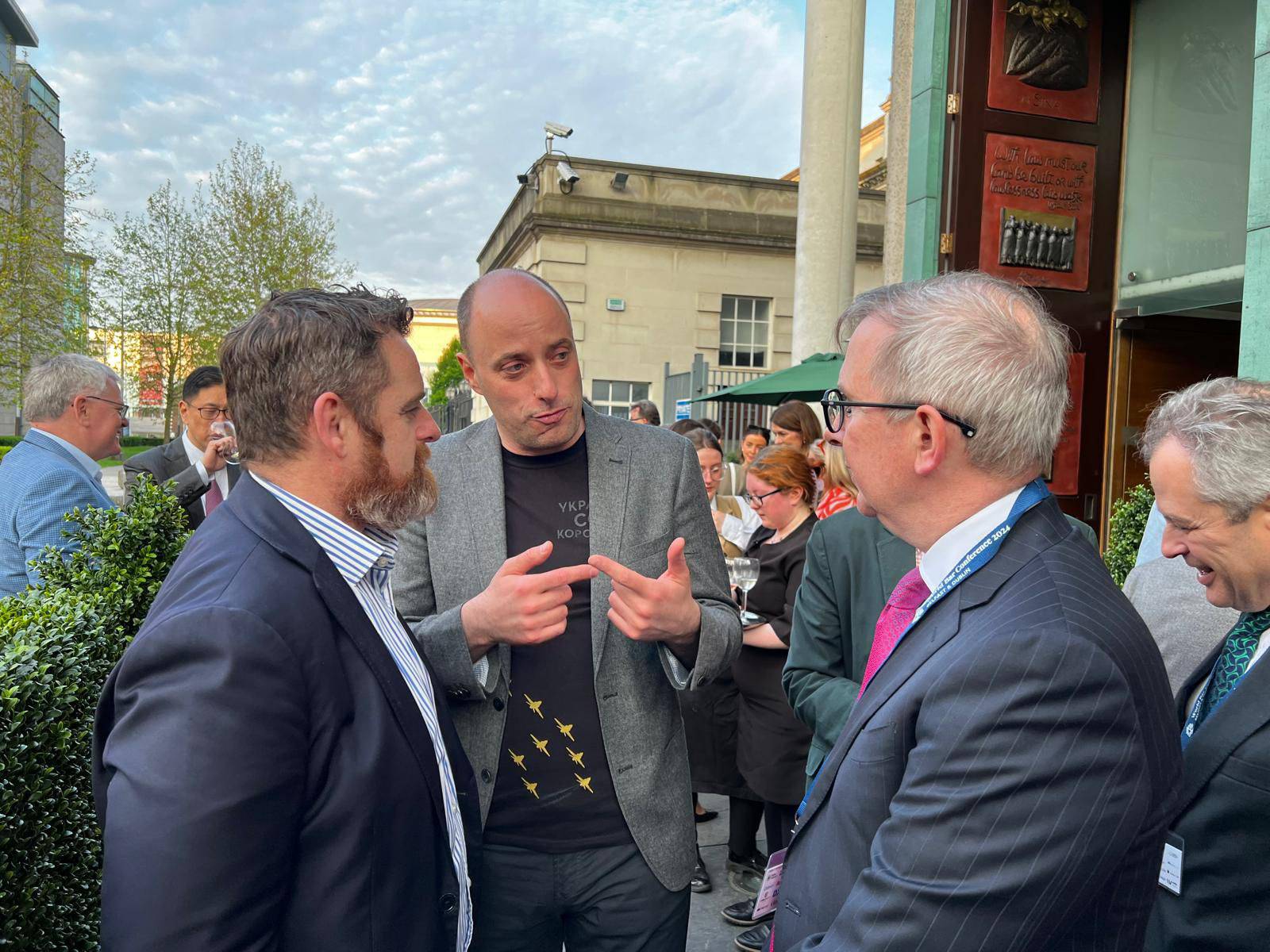
Additionally, during those days, EUAM Ukraine, the UK Government and IRLI organised a study visit for Ukrainian prosecutors to London and Dublin to meet their international counterparts. This visit aimed to exchange experiences, update international colleagues on the situation in Ukraine, and voice concerns and issues with partners willing to support Ukraine in its fight for freedom and sovereignty. The OPG delegation attended meetings with British and Irish authorities, including the Foreign, Commonwealth and Development Office, the Home Office, the Metropolitan Police, and the Bar of England and Wales in London. In Dublin, they met with An Garda Síochána (the Irish National Police Force), and the Office of the Director of Public Prosecutions.
To gain insights from the conference, learn about the outcomes of the study visit, and explore future cooperation prospects between the OPG and EUAM, we spoke with Yuriy Belousov, Head of the Department for Combatting Crimes Committed in Conditions of Armed Conflict at the Office of the Prosecutor General of Ukraine, and Aonghus Kelly, Head of the International Crimes Legal Unit at EUAM.
Ukrainian Voice at the World Bar Conference 2024
EUAM: Mr. Belousov, what was your main message to the legal community at the WBC 2024? Do you believe it was heard by your international colleagues?
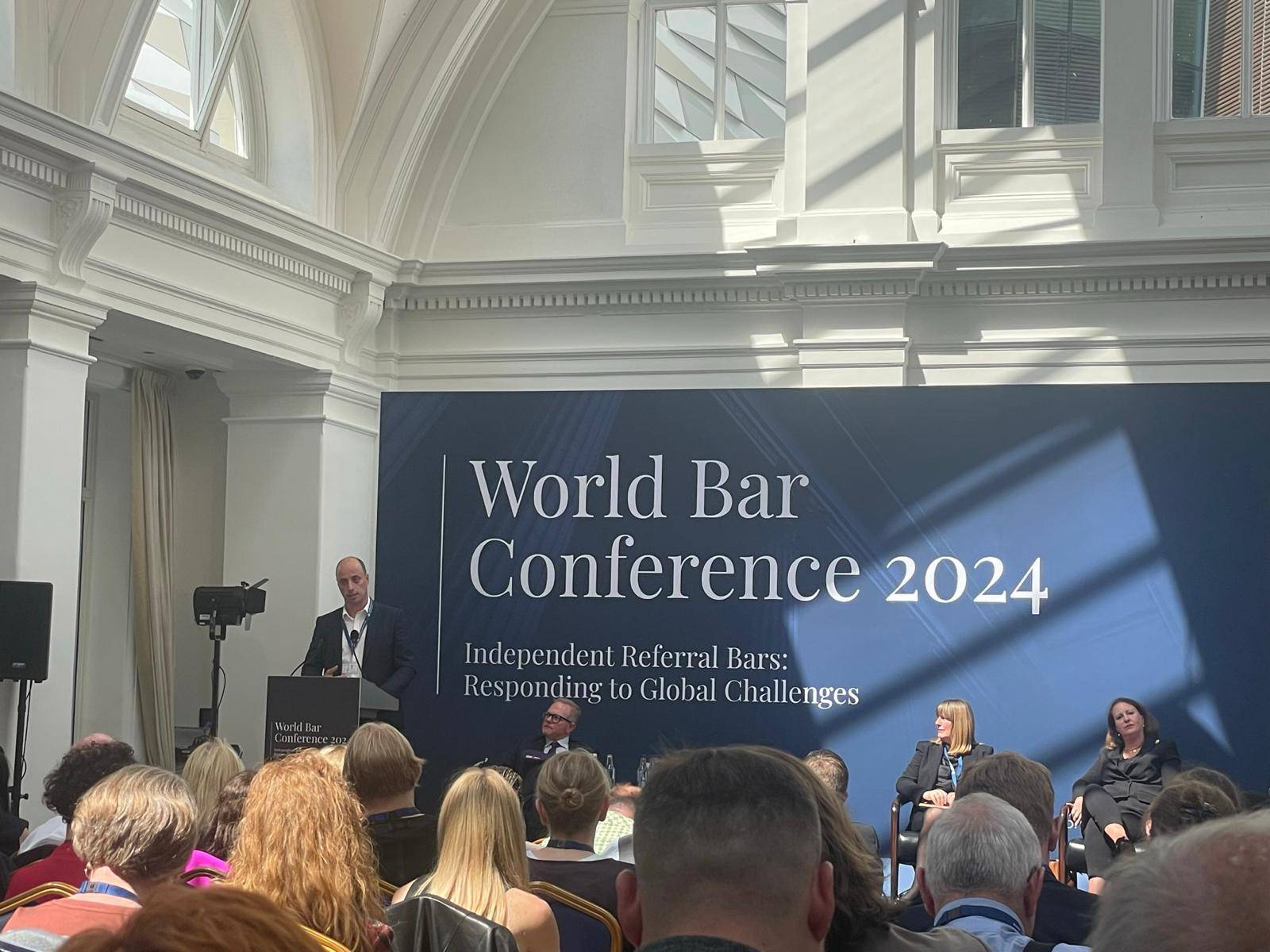
Yuriy Belousov (YB): I really believe participation in such a platform like the World Bar Conference is crucial for Ukraine, as we could directly address our issues of concern to our partners and get their feedback. My main message was to explain to our colleagues that Ukraine, at this moment, fights not just for itself but for the values of the whole democratic world. That’s why the support of Ukraine is so important – if we lose – democracy will lose. I believe I was heard.
EUAM: Mr. Kelly, in your opinion, is the presence of Ukrainian prosecutors at international legal conferences like the WBC important, and how does EUAM support their participation?
Aonghus Kelly (AK): The war in Ukraine and the committing of international crimes continue apace unfortunately. Our Ukrainian colleagues are seeking assistance in speaking to, engaging with, and exchanging experiences and know-how with other criminal justice actors from across the world. Conferences like the WBC allow our Ukrainian colleagues to raise awareness off the reality of the situation in Ukraine and the ongoing need for support of their work. EUAM was contacted by the WBC Organising Committee (‘the Committee’) to facilitate Ukrainian participation at the conference, which was discussing the ‘Rule of Law Under Fire: Existing in an Age of Conflict’ amongst other topics. EUAM, in cooperation with the Committee and the British and Irish authorities, built a programme of engagements with criminal justice chain actors to best assist Ukraine in London, Dublin, and Belfast in the days before and after the conference.
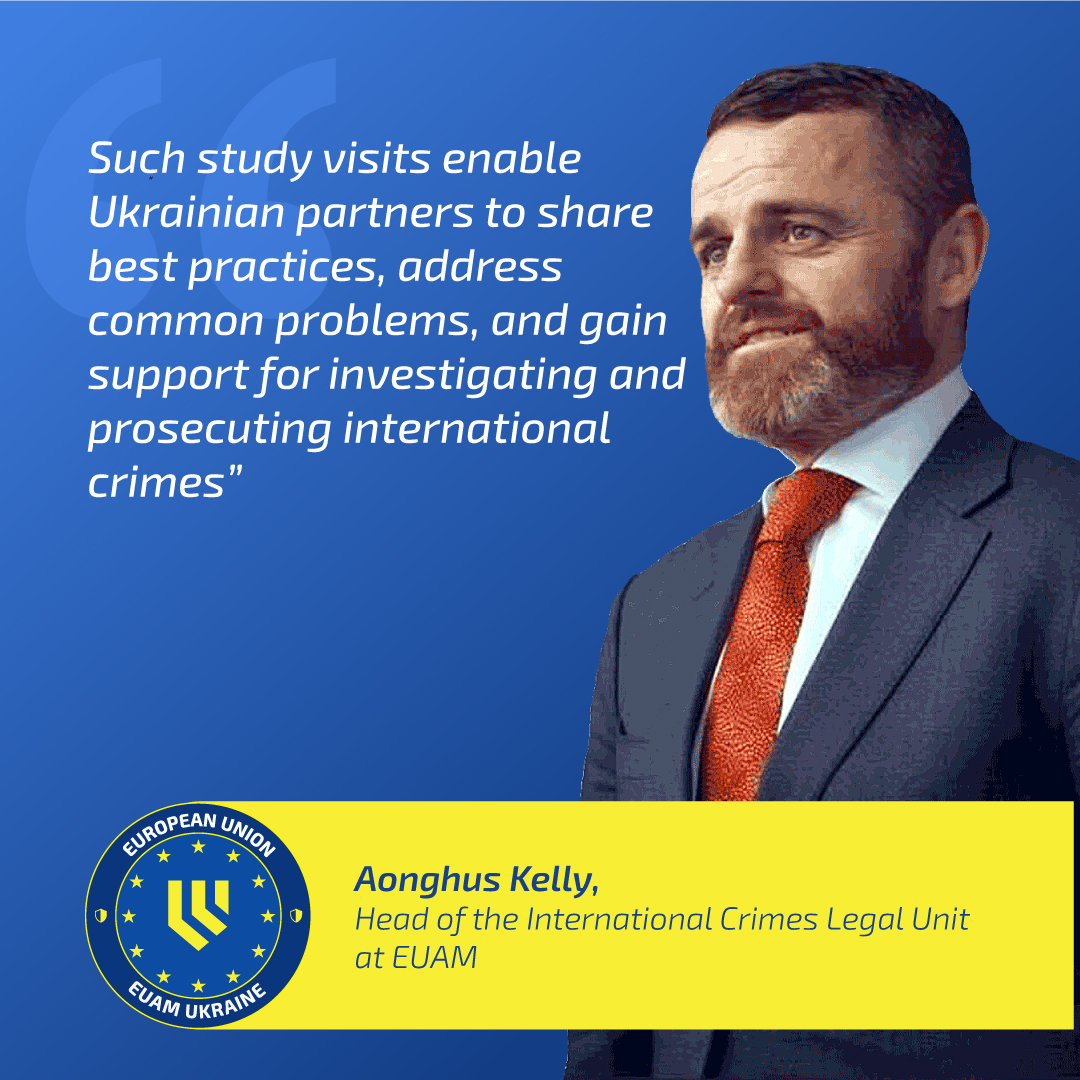
Study Visits: Are They Important?
EUAM: Your prosecutor colleagues were simultaneously on a study visit to London and Dublin, facilitated by EUAM. What are the main outcomes of this visit?
YB: The main outcomes of the study visit to London and Dublin, facilitated by EUAM, included enhanced understanding and knowledge exchange regarding the investigation and prosecution of international crimes. Such visits are instrumental in building the capacity of Ukrainian prosecutors and fostering collaboration with international counterparts.
EUAM: Why are such visits necessary, if at all, for Ukrainian prosecutors?
YB: Visits like the one to London and Dublin are necessary for Ukrainian prosecutors to gain exposure to international best practices, receive specialised training, and establish networks with their counterparts in other countries. These experiences are invaluable for professional development and improving the effectiveness of Ukraine’s judicial system, especially in the context of international crimes.
EUAM: Mr. Kelly, can you elaborate on the main outcomes of the recent study visit to London and Dublin for Ukrainian prosecutors, facilitated by EUAM?
AK: The meetings in London and Dublin with the British and Irish authorities were well received by all parties and assisted with further growing relations between the OPG and investigative and prosecutorial bodies from Ireland and the United Kingdom (UK). This is particularly important crossover work for all parties given the EU and UK’s firm commitment to the Atrocity Crimes Advisory Group (ACA) of which EUAM is an implementing entity. The focus of the study trip on key areas of assistance for the investigation and prosecution of international crimes was fruitful. Plans have already been put in place to utilise the lessons learnt and further deepen cooperation between all parties in this field to best assist Ukraine.
EUAM: How do such study visits contribute to the professional development of Ukrainian prosecutors, specifically in investigating and prosecuting international crimes committed in Ukraine?
AK: International study visits and training programmes allow Ukrainian prosecutors to interact with colleagues from other jurisdictions, discuss best practices, and address common problems. Furthermore, such events also allow Ukraine to access support from international actors on case-related and systematic issues they face while investigating and prosecuting international crimes cases in Ukraine.
EUAM: Is EUAM planning to continue facilitating similar study visits on the topic of international crimes within the new mandate?
AK: EUAM has an ongoing and very regular dialogue with our Ukrainian colleagues on how we can best assist them. This will most definitely include training, capacity building, equipment assistance, and study trips to best assist Ukraine in its ongoing work on accountability.
Cooperation Between EUAM and OPG is Progressing
EUAM: Mr. Belousov, the Mission has a new mandate, with supporting Ukraine on international crimes as one of the four priorities. How successful is our cooperation with the Office of the Prosecutor General so far? What are the further plans and ways to strengthen it?
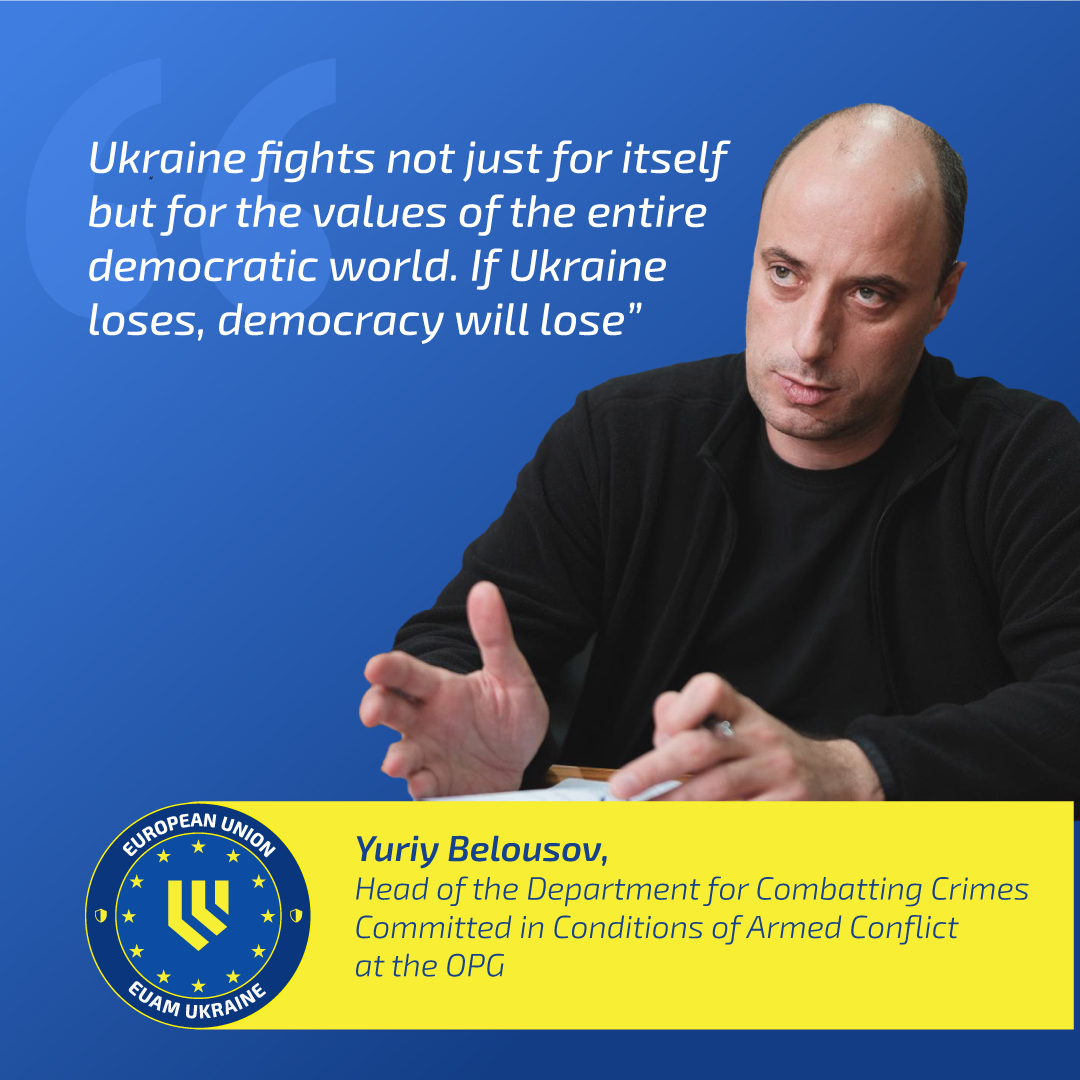
YB: The cooperation between EUAM and the OPG has been progressing, with EUAM’s new mandate emphasising support for Ukraine on international crimes. The plans to strengthen this cooperation involve continued collaboration, sharing of expertise, and joint efforts in advancing the investigation and prosecution of international crimes. In particular, it would be extremely important to proceed with building our cooperation on getting Ukrainian prosecutors and investigators access to available data from IT companies, as well as to get further support to regional war crimes teams, both expert and technical.


